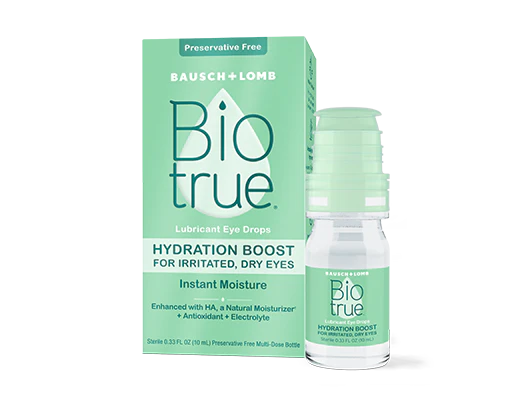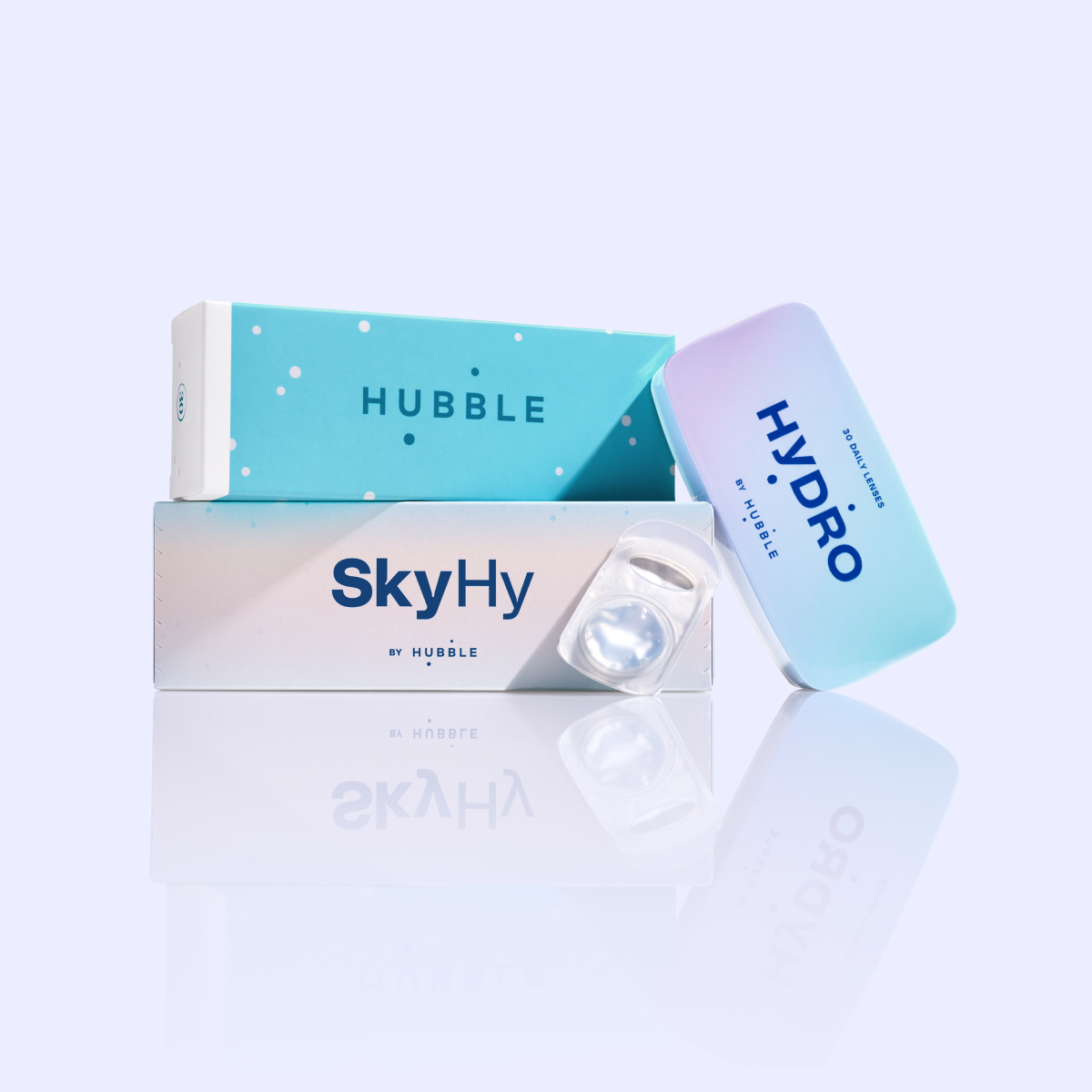Are Eye Drops Safe? Best Practices and What to Know

In light of recent eye drop recalls, it's crucial to understand the safety and best practices for using eye drops, especially for contact lens wearers. In this article, we’re addressing common concerns and questions regarding eye drops, and breaking down everything you need to know about using them safely alongside your contact lenses.
Understanding the Eye Drop Recall: What Happened?
You may have seen headlines or read articles highlighting a November 2023 recall for over-the-counter eye drops. The Food and Drug Administration (FDA) has issued warnings about popular ophthalmic solutions or eye drops. This initially included 26 products, sold at major retailers such as Target, Walmart, and CVS, and later expanded to include additional brands and products. Visit the FDA website for a full and up-to-date list of products affected by this recall.
No eye drops or eye care accessories sold by Hubble have been included as part of this recall. The recalled eye drop products present a risk of infection if consumers use them. If you find yourself having symptoms that include persistent eye redness, pain, soreness, or itchiness after using the listed recalled eye drops, immediately discontinue using the eye drops and seek medical advice from an eye care or health care provider.
Are Eye Drops Safe? Unpacking the Facts
Outside of the specific recalled products, lubricating eye drops are generally safe to use, if one follows the product directions and best practices.
Ensuring the safety of eye drops is essential to maintain eye health. Here are some general safety measures and tips for using eye drops:
Consult an Eye Care Professional - Before using any eye drops, it's advisable to consult with an eye care professional, such as an optometrist or ophthalmologist. They guide on the most suitable eye drops for your specific eye condition or symptoms.
Check Expiration Dates - Always check the expiration date on the eye drop packaging. Using expired eye drops may be ineffective and could potentially lead to irritation or other adverse reactions.
Follow Storage Instructions - Pay attention to the recommended storage conditions for the eye drops. Some eye drops may need to be stored in a cool, dry place, while others may require refrigeration. Improper storage can impact the effectiveness and safety of the product.
Avoid Contamination - To prevent contamination, do not touch the tip of the eye drop container to any surface, including your fingers or eyes. Contamination can introduce bacteria into the solution and increase the risk of eye infections.
Wash Hands Thoroughly - Before applying eye drops, wash your hands thoroughly with soap and water. This helps prevent the transfer of dirt, bacteria, or other contaminants to the eye drop bottle and, subsequently, to your eyes.
Follow Dosage Instructions - Adhere to the recommended dosage instructions provided by your eye care professional or the product packaging. Using more drops than prescribed or recommended may not provide additional benefits and could lead to unwanted side effects.
Remove Contact Lenses - If you wear contact lenses, remove them before applying eye drops unless the product is specifically designed for use with contacts. Wait for at least 15 minutes before reinserting the lenses to avoid potential interactions between the eye drops and the contacts.
Seek Professional Advice - If you have any concerns or questions about the safety of a particular eye drop product or its compatibility with your specific eye condition or medications, seek advice from your eye care professional.

Can You Use Eye Drops with Contacts?
There are specific types of eye drops designed to be used with contact lenses. These are often referred to as "contact lens rewetting drops’" or "contact lens lubricating drops." These drops are formulated to provide relief for dryness and discomfort that may occur while wearing contact lenses.
If you wear contact lenses and experience dryness, irritation, or discomfort, using contact lens-compatible eye drops can help lubricate your eyes and improve comfort. However, it's important to follow a few guidelines:
Choose the Right Drop - Look for eye drops labeled as "contact lens rewetting drops" or "contact lens lubricating drops." These are designed to be compatible with contact lenses. Biotrue Hydration Boost Eye Drops are available on the Hubble website and can be used with or without contact lenses.

Remove Lenses Before Use (If Required) - Some eye drops may recommend removing your contact lenses before application. Always follow the specific instructions on the product packaging.
Wait Before Reinserting Lenses - If you need to remove your contact lenses before using the drops, wait for a specified amount of time (usually around 15 minutes) before reinserting your lenses. This helps prevent any potential interaction between the eye drops and the contact lenses.
Avoid Preserved Drops if Sensitive - Some individuals may be sensitive to preservatives in eye drops. If you have sensitivity or allergies, consider using preservative-free eye drops, which are available in single-use vials.
Consult Your Eye Care Professional - If you have specific concerns about using eye drops with your contact lenses or if you're unsure which product is suitable for your needs, consult with your eye care professional. They can provide personalized advice based on your eye health and the type of contact lenses you wear.
Can You Use Contact Solution as Eye Drops?
No, you should not use contact solution as eye drops, or put the product directly into your eye. While contact solutions and eye drops are both designed for use with the eyes, they serve different purposes and are not always interchangeable. Contact solution is primarily formulated to clean, disinfect, and store contact lenses. It may contain ingredients such as preservatives, disinfectants, and moisturizers that are suitable for contact lenses but may not be ideal for direct use in the eyes.
Eye drops are designed to relieve dryness, redness, and irritation in the eyes, and they typically lack the preservatives and disinfectants found in contact solutions.
Can You Use Expired Eye Drops?
No, it is not advisable to ever use expired eye drop products. Using expired eye drops can pose certain risks and may lead to adverse effects. The expiration date on medication and eye drop packaging indicates the period during which the product is expected to remain stable and effective. Here are some potential risks associated with using expired eye drops:
Reduced Effectiveness - Over time, the active ingredients in eye drops may degrade, leading to a decrease in their effectiveness. Expired eye drops may not provide the intended relief for symptoms such as dryness, redness, or irritation.
Risk of Contamination - As the product ages, the preservatives that help prevent bacterial contamination may lose their efficacy. Using expired eye drops increases the risk of introducing harmful bacteria into the eyes, potentially leading to infections.
Eye Irritation - Expired eye drops may contain breakdown products or other substances that can irritate the eyes. This irritation may manifest as redness, itching, or discomfort.
Can You Use Redness Relief Eye Drops with Contacts?
Redness relief eye drops are commonly used to alleviate redness and irritation in the eyes. Generally, you should not use these eye drops with contact lenses. When wearing contact lenses, there are specific concerns that need to be addressed to ensure optimal eye health and comfort.
Concerns of Using Redness Relief Eye Drops with Contact Lenses:
Interaction with Contact Lens Solution - Redness relief eye drops may contain preservatives or other ingredients that can interact with the contact lens solution. This interaction can cause discomfort, blurred vision, and even damage to the contact lenses themselves.
Dryness and Irritation - Some redness relief eye drops can temporarily relieve redness by constricting blood vessels in the eyes. However, this can also lead to dryness and irritation, especially when used frequently or for an extended period. These symptoms can be exacerbated when wearing contact lenses, as they can further contribute to dryness and discomfort.
Allergic Reactions - Certain individuals may be allergic to the ingredients present in redness relief eye drops. When wearing contact lenses, an allergic reaction can lead to severe discomfort, redness, itching, and even swelling of the eyes. It is crucial to determine any potential allergies before using these eye drops.
Safe Alternatives to Using Redness Drops as a Contact Lens User:
Lubricating eye drops, also known as artificial tears, provide relief for dryness and irritation without the potential risks associated with redness relief eye drops. These drops are specifically formulated to mimic the natural tears, providing moisture and comfort to the eyes.
Similarly, Contact lens rewetting drops are designed to rehydrate and lubricate contact lenses, alleviating dryness and discomfort. These drops are specifically formulated to be safe for use with contact lenses and can provide relief from redness caused by lens dryness.
If redness and discomfort persist, it is essential to consult with an eye care professional. They can provide specialized recommendations and prescribe eye drops that are safe to use with contact lenses. This ensures the proper treatment of any underlying eye conditions while maintaining the health of your contact lenses.
Choosing the Right Eye Drops for Contact Lens Wearers
To ensure optimal eye health, select appropriate eye drops for contacts. Consider using a lubricating eye drop to help reduce dryness and discomfort. Here are some eye drop product types and additional considerations for contact lens users:
Contact Lens Rewetting Drops - These drops are specifically designed to provide moisture and alleviate dryness for contact lens wearers. They can be used throughout the day to refresh and lubricate the eyes. Look for products labeled as "contact lens rewetting drops."
Preservative-Free Drops - Some individuals may be sensitive to preservatives found in certain eye drops. If you have sensitivity or allergies, consider using preservative-free lubricating eye drops. These are often available in single-use vials.
Contact Lens Material, like Hydrogel vs. Silicone Hydrogel Lenses - The type of contact lenses you wear can influence the choice of eye drops. Silicone hydrogel lenses tend to be more breathable than traditional hydrogel lenses, and some eye drops are specifically formulated to work well with these types of lenses.
Multi-Purpose Solutions - Some multi-purpose contact lens solutions come with built-in rewetting agents. These solutions are designed for cleaning, disinfecting, and storing contact lenses, and they may also be used to rewet lenses during the day.
Artificial Tears - Artificial tears are lubricating eye drops that can help relieve dryness and discomfort. Look for preservative-free artificial tears, especially if you plan to use them frequently throughout the day.
Preventing Eye Infections: Tips for Contact Lens Wearers
To ensure your eyes are healthy and free from infections or potential complications, there are several simple habits that you can maintain. We’ve compiled our top tips for contact lens use below.
* Wash and dry your hands thoroughly before handling your contact lens.
* Remove your contacts before swimming or getting into a pool.
* Never shower with your contacts in.
* Do not sleep with your contacts in, unless they are explicitly intended for overnight use.
* Keep your contacts in the contact case when not in use.
* Change your contact lens case occasionally; every 3 months is recommended.
* Use a contact lens cleaner specifically designed for the type of contact lenses you have.
* Dispose of the reserved contact solution before storing your contact lenses.
* If you feel any eye irritation while wearing your contacts, remove them and rinse them with the eye solution. Do not rub your eyes as that might cause infection if there happens to be any debris on the lens.
* If you have dry eyes, do not use over-the-counter eye drops as a quick fix. Use only doctor-prescribed eye washes made for contacts.
* Do not share your contact lenses with anyone.
* Do not rub your eyes when you feel any eye irritation while wearing your contacts. Remove the contact lenses and rinse them with an eye solution.
When to Seek Professional Help for Eye Issues
Be sure to follow proper hygiene and handling procedures for your contact lenses especially as it relates to contact lens drops and solutions. Be mindful of contact lens solution expiration dates. Do not use old or expired eye drops, whether prescribed or over the counter. In light of the recent recall, the FDA recommends checking the label of any eye drops you already own and disposing of any recalled products.
If you experience progressive eye pain, redness, runny eye, and discomfort that can be indicative of a serious eye condition like conjunctivitis (pink eye) or another eye infection. Seek help from your eye doctor or other medical professional.
Discover Hubble's Eye Care Solutions
At Hubble, we aim to be the one-stop destination for all of your vision needs, including contact lenses, eyeglasses, and eye care accessories, like eye drops. We’ve reimagined the contact lens experience from the ground up, with our signature daily contacts subscription service.
Our Hydro by Hubble Contacts features the slimmest contact lens packaging in the world, with less waste, less plastic, and more convenience. The unique hygienic touch packaging always places the lens correctly face down, allowing the wearer to only touch the outer lens surface for a quicker, more hygienic experience. These disposable contact lenses are designed for all-day comfort with a trim, thin edge, making them extra easy to pop in and out.
Classic by Hubble Contacts are made with methafilcon A hydrogel material, and contain 55% water content. Your first order of our 15-day starter pack is always just $1.
SkyHy by Hubble Contact Lenses features increased oxygen permeability for enhanced comfort and more breathability.
Keep your eyes safe and healthy, and your vision needs in sight, and out of mind with Hubble.



